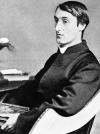To Christ our LordTo Christ our Lord This epigraph dedicated the poem to Jesus while echoing the Latin phrase, Ad Majorem Dei Gloriam, the Jesuit motto meaning “To the Greater Glory of God.”
I caught this morning morning's minionminion favorite, darling; also, an underling or servant, king-
dom of daylight's dauphindauphin prince; a French historical term, along with “chevalier”, dapple-dawn-drawn Falcon, in his riding
Of the rolling level underneath him steady air, and striding
High there, how he rung upon the rein of a wimplingwimpling rippling wing
In his ecstasy! then off, off forth on swing,
As a skate's heel sweeps smooth on a bow-bend: the hurl and gliding
Rebuffed the big wind. My heart in hiding
Stirred for a bird, – the achieve of, the mastery of the thing!
Brute beauty and valour and act, oh, air, pride, plume, here
Buckle!Buckle! to bend, attach; prepare for flight or battle. The verb could be descriptive of the bird’s action, or it could be the speaker’s imperative. AND the fire that breaks from thee then, a billion
Times told lovelier, more dangerous, O my chevalier!chevalier French word for “knight” or “champion”; pronounced Chev-ah-leer, to rhyme with “here” and “dear”
No wonder of it: shéer plódshéer plód slowly, laboriously, and without break; these accent marks, inserted by Hopkins, tell the reader to place more accent or emphasis on those syllables when reading aloud makes plough down sillionsillion Fresh soil upturned by a plow (“plough”)
Shine, and blue-bleak embers, ah my dearah my dear Compare with the same phrase in the poem “Love (III)” by George Herbert, a poet Hopkins admired.,
Fall, gallgall to become sore, crack, or chafe themselves, and gash gold-vermilionvermilion a vibrant scarlet color.






